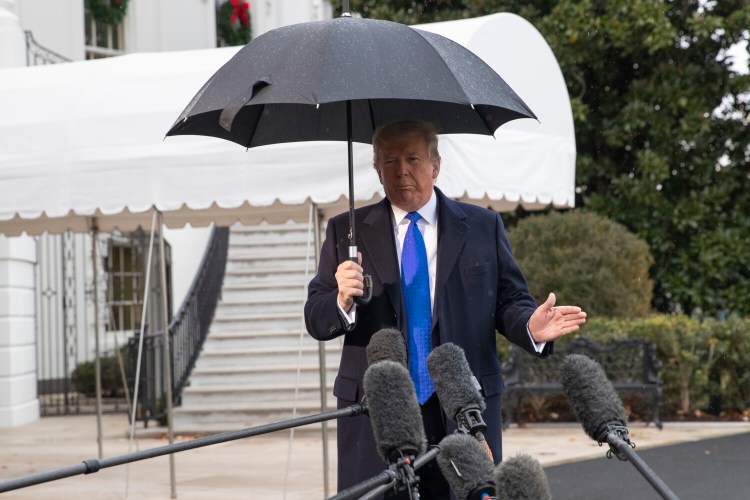President Donald Trump’s myriad abuses of power could easily provide the basis for several articles of impeachment. But on Tuesday House Democrats unveiled only two, both related to Trump’s unconscionable attempt to pressure Ukraine to announce investigations that would benefit him politically.
Even if you think the bill of particulars should be longer — and this page has suggested a possible additional article of impeachment based on Trump’s efforts to thwart the investigation of special counsel Robert S. Mueller III — the two that the House has drafted fully justify the grave step of impeachment. In this case, two is enough.
The first article alleges that Trump abused the power of his office when he “solicited the interference of a foreign power, Ukraine, in the 2020 United States presidential election.” Specifically, Trump attempted to have Ukraine publicly besmirch former Vice President Joe Biden, a potential rival in the 2020 presidential race, and shore up a conspiracy theory that Ukraine, not Russia, hacked Democratic Party emails during the 2016 presidential campaign.
Moreover, the first article persuasively argues that Trump conditioned “official United States Government acts of significant value to Ukraine” — a White House meeting for Ukrainian President Volodymyr Zelensky and the release of $391 million of congressionally appropriated security aid — on a public announcement by Ukraine of the investigations Trump wanted.
The second article accuses Trump of obstructing Congress by ordering “the unprecedented, categorical and indiscriminate defiance of subpoenas issued by the House of Representatives” pursuant to its power of impeachment.
By emphasizing that the defiance by the White House was “categorical” and “indiscriminate,” the drafters of the article have anticipated an argument by Trump’s defenders that he has the right to assert privilege to block the testimony of key advisors. The White House has claimed testimonial immunity for former deputy national security advisor Charles M. Kupperman, who asked a federal court to rule on whether he must comply with a House subpoena.
But Trump has gone far beyond asserting executive privilege in narrow cases. Rather, he has refused across the board to cooperate with an investigation that his White House counsel has dismissed as a “purported ‘impeachment inquiry’” and a “charade.”
It’s fortunate that several officials disregarded the White House’s warnings not to cooperate and testified in detail to the existence of the corrupt scheme described in the first article of impeachment. But that doesn’t excuse the president’s obstruction.
No doubt the Democrats confined the articles of impeachment to the Ukraine scandal for political reasons. They fear a Mueller-related article could complicate the reelection prospects of some Democrats in competitive districts by making it easier for Trump to argue that the current impeachment effort is a sequel to what he calls the “Russia hoax.” It’s also worth remembering that it wasn’t until the revelations about Trump’s improper approach to Ukraine that some Democrats — including House Speaker Nancy Pelosi (D-San Francisco) — warmed to the idea of an impeachment inquiry.
Still, no one should think that these two articles exhaust the case against Trump, whose contempt for the rule of law and for the norms of governance seem to lead him regularly to the brink of what’s acceptable — and beyond.
But with their careful and damning explication of the Ukraine scandal, the articles more than suffice to justify his impeachment.
Editorial by the Los Angeles Times
Visit the Los Angeles Times at www.latimes.com
Distributed by Tribune Content Agency, LLC.
Send questions/comments to the editors.



Comments are no longer available on this story